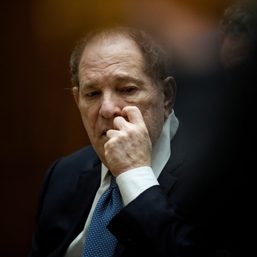SUMMARY
This is AI generated summarization, which may have errors. For context, always refer to the full article.

NEW YORK, USA – Pfizer chief executive Albert Bourla called US plans to negotiate drug prices for its Medicare health program “negotiation with a gun to your head” and said he expects drugmakers to sue in an attempt to halt the process.
“It is not negotiation at all. It is price setting,” Bourla said at a Reuters newsmaker event on Thursday, May 11, referring to the Biden administration’s signature drug pricing reform, part of the Inflation Reduction Act. The law aims to save $25 billion through price negotiations by 2031 for Americans who pay more for medicines than any other country.
The pharmaceutical industry says the law, passed last year, will result in a loss of profits that will force drugmakers to pull back on developing groundbreaking new treatments.
The companies have begun laying the groundwork to fight the US plan, Reuters reported earlier this week.
“I think that there will be legal action,” he said, adding that he was not sure if that would stop the plan before new prices would go into effect in 2026. Bourla said he is also not optimistic that Congress will act to change the law.
Drugs likely to be among the first subject to negotiation include Pfizer’s breast cancer treatment Ibrance and the blood thinner Eliquis, which Pfizer shares with Bristol Myers Squibb.
Bourla did acknowledge some positive aspects of the law for patients, such as lower out-of-pocket costs for medicines.
A spokesperson for the US Centers for Medicare and Medicaid Services (CMS), which will oversee the drug price talks, said in an emailed statement, “We have been regularly engaging with interested parties, including manufacturers, health plans, and patient groups, to gather input and feedback throughout implementation.”
After considering the comments it receives, the agency said it “will issue revised guidance in the summer of 2023.”
Bourla is looking to shift Pfizer’s focus from the COVID-19 vaccines and treatment that put the company at the forefront of the pandemic response and led to a once-in-a-lifetime surge in revenue.
The company is in the midst of a steep but expected fall in COVID product sales and is also preparing for declining revenue in coming years for some of its top-selling drugs as they begin to face competition from cheap generics.
As a result, investors are looking for Pfizer to produce new blockbuster drugs that can pull in billions every year, either from the company’s own pipeline of medicines in development or through deals.
Bourla led Pfizer as the New York-based drugmaker raced alongside German partner BioNTech to develop a vaccine for COVID as much of the world locked down in 2020. The company also developed Paxlovid, a life-saving antiviral treatment for the disease.
The COVID products drove Pfizer’s revenue to record levels, topping $100 billion in 2022 and $80 billion in 2021.
“Pfizer is giving all the profits that we made from COVID in ’21 and ’22 and what we will make in ’23 to acquire technology and products that we believe will allow us to battle cancer,” he said, calling the effort the drugmaker’s “next moonshot.”
‘Not about abortion pills’
Bourla has overseen a string of acquisitions to bolster Pfizer’s drug pipeline, headlined by the $43-billion deal for Seagen, which makes complex targeted cancer therapies.
The drugmaker also spent billions on its purchases of migraine drugmaker Biohaven Pharmaceutical, ulcerative colitis drug developer Arena Pharmaceuticals, and Global Blood Therapeutics, maker of a sickle cell disease treatment.
Bourla said he anticipates only doing modestly sized deals in the near term as he concentrates on the Seagen integration.
As the company works to develop new drugs, Bourla raised concerns about a recent ruling by a judge in Texas that suspended abortion pill mifepristone’s 2000 approval by the US Food and Drug Administration. The US Supreme Court put that order on hold, leaving the drug used in more than half of US abortions on the market while the case is appealed.
Bourla signed an open letter by hundreds of industry executives calling on the Supreme Court to reverse the Texas judge’s decision. On Thursday, he called the FDA “the most iconic regulatory body in the world,” and said citizens can trust that the regulators have done the work to confirm whether drugs are safe.
“This is not about abortion pills…. It has to do with the ability of a judge to say whether a medicine is safe and effective,” Bourla said. “That undermines the whole system of trust.” – Rappler.com
Add a comment
How does this make you feel?





There are no comments yet. Add your comment to start the conversation.